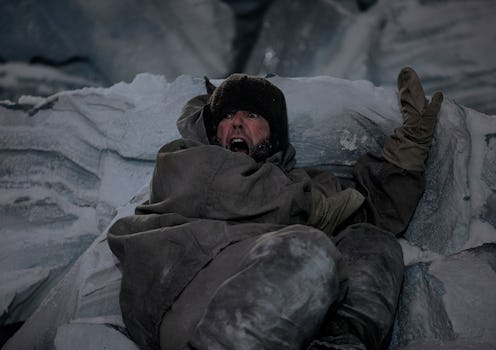Entertainment
'The Terror' Is Taking On A Super Timely Issue For Season 2

Over the last several months, the United States government has been separating families crossing the border illegally, be they asylum seekers or just people looking for a new home. Recently, images of the children detained by this policy has drawn comparisons to an event that will be tackled in Season 2 of The Terror — the internment of Japanese-Americans during World War II, the A.V. Club reported.
The second season of The Terror will "center on an uncanny specter that menaces a Japanese-American community from its home in Southern California to the internment camps to the war in the Pacific," according to a press release about the AMC series.
The relevance of the show's past setting as it compares to the current immigration crisis is not something that's lost on The Terror's crew. “[We] hope to convey the abject terror of the historical experience in a way that feels modern and relevant to the present moment," new showrunner Alexander Woo explained in a statement released by AMC.
Max Borenstein, an executive producer and writer for the new season, added, "The Japanese-American internment is a blemish on the nation’s conscience ... I’m thrilled that AMC is giving us the chance to use that darkness as the inspiration for what I hope will be a trenchant, terrifying season of TV."
The internment of Japanese-Americans during World War II was, without question, a terrifying moment in our country's history. It's also a moment that feels all-too present to anybody who has been keeping up with the news as of late. There are, of course, differences between what happened in the U.S. during the 1940s and what's happening to immigrant families right now — for example: families were generally kept together in the Japanese interment camps, as Time pointed out — but, the motivation behind the imprisonment of minorities and the images of children put in detention centers in the United States are eerily similar.
Prior to April of 2018, families caught crossing the border illegally to enter into the U.S. remained together until the courts either granted them asylum or ordered them to return to their home country, according to the New York Times. After Attorney General Jeff Sessions announced the Trump administration's new zero-tolerance policy, however, illegally-entering adults were charged and jailed, while their children were held separately in detention centers.
On June 20, Trump signed an executive order that both maintains the zero-tolerance prosecution policy and allows families to be kept together in designated facilities for illegal immigrants, as per CNN. It's still unclear how or when previously-separated families will be reunited, as well as whether or not newly-detained families will continue to be separated until the executive order is implemented.
The common thread between the current immigration crisis and the internment of Japanese-Americans in the 1940s, besides putting innocent children behind fences, is the perception of minorities as a threat to national security. After the attack of Pearl Harbor on Dec. 7, 1941, many Americans reportedly feared that Japanese families living in the U.S. would want to seek revenge, Time explained.
Because of this fear, President Roosevelt signed an order that prevented Japanese-American families from living in certain areas of the U.S. — primarily on the West Coast — which resulted in the removal of these families from their homes, as per the Smithsonian magazine. The government subsequently placed them in detention camps, often for years at a time. Many of these families were actually U.S. citizens who were forced to abandon their property, homes, families, and loved ones, simply because they were of Japanese descent.
It's unclear how — or even, if — the second season of The Terror will choose to portray the similarities between the past and present internment camps in the United States, but the show's subject matter will undoubtedly resonate with viewers who are watching history repeat itself.